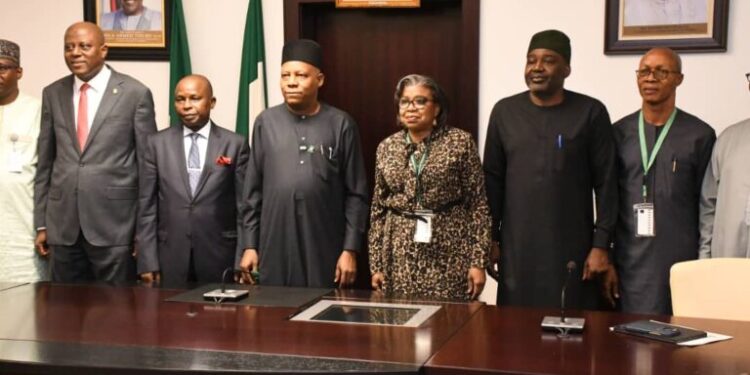Speaking during the Meeting of the Board on Wednesday at the Presidential Villa, the Vice President who is also Chairman of the Board charged the members to come up with a more strategic approach to public debt management.
He noted that Nigeria must continue to use public debt as a vehicle for the development of critical infrastructure and tool for economic growth and poverty reduction.
“With prudent management, debt can be transformed into an asset for economic growth and poverty reduction. Our goal must be to formulate policies, regulations, and guidelines for the DMO, with a view to achieving long-term debt sustainability for our country,” the VP stated.
VP Shettima explained that this approach aligns with the Renewed Hope Agenda of President Bola Ahmed Tinubu’s administration, which prioritizes fiscal discipline, economic stability, and sustainable development.
He stressed that borrowing, when applied prudently, could serve as a catalyst for economic growth rather than a financial liability.
“As you all know, public debt, if prudently applied, becomes an asset for economic growth and poverty reduction. However, recent realities in our economy call for stronger coordination between our fiscal and monetary policies,” he said.
The Vice President commended President Bola Ahmed Tinubu for his economic reforms, acknowledging the President’s dogged efforts towards reforming the Nigerian economy.
He also praised the Minister of Finance and Coordinating Minister of the Economy @FinMinNigeria and the DMO @DMONigeria leadership for their untiring efforts in the day-to-day management of the nation’s sovereign debt portfolio.
“I want to commend the dedication of our leader, President Bola Ahmed Tinubu @officialABAT, GCFR, in his dogged efforts towards reforming our economy. I applaud the Honourable Minister of Finance and the Coordinating Minister of the Economy, and the DMO Management, for their untiring efforts in the day-to-day management of our sovereign debt portfolio,” he said.
The Vice President also noted Nigeria’s recent success in the global financial market on the issuance of a $2.2 billion double-tranche Eurobond, which he described as a testament to investor confidence in the country.
“I also use this opportunity to congratulate them and other members of the Nigerian delegation for a successful outing in the recent $2.2 billion double-tranche Eurobond issuance. The over-subscription rate of the bonds showed an impressive appetite for our country’s sovereign instruments in the global capital market.
Other members of the Board are Minister of Finance and Coordinating Minister for the Economy, Wale Edun (Vice Chairman); Attorney General of the Federation and Minister of Justice, Lateef Fagbemi (member); Special Adviser to the President on Economic Matters, Dr. Tope Fasua (member); Governor of the Central Bank of Nigeria (CBN), Olayemi Cardoso (member); Accountant-General of the Federation (OAGF), Dr. Oluwatoyin Sakirat Madein (member), and Director-General of the Debt Management Office, Patience Oniha (Secretary).











